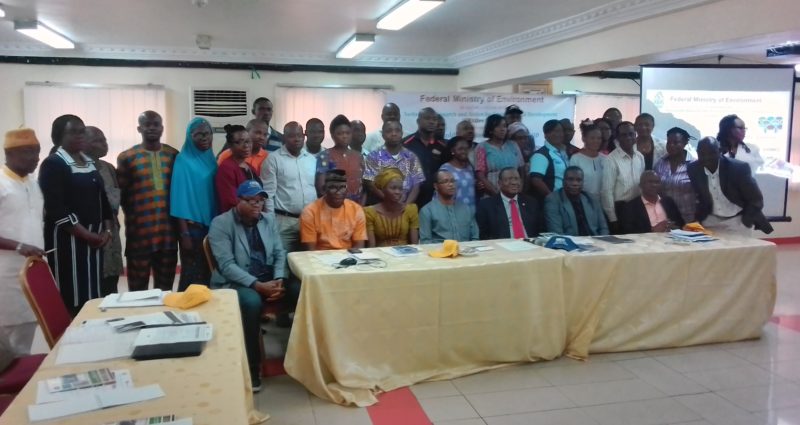Bothered by the unsavoury effects of lead to man and the environment, the Consumer Protection Council (CPC) has said that it is ready to ensure that Nigerian markets are rid of lead-laden products.

Director-general of CPC, Babatunde Irukera, declared this at the Lead Paint Elimination Campaign organised by Sustainable Research and Action for Environmental Development (SRADev Nigeria), in Lagos on Friday, December 8, 2017.
Olusanya asserted this in a presentation titled: “The Role of Consumer Protection Council in Substandard Lead Paint Elimination In Nigeria.”
Olusanya stated that “lead in paint that appears intact is not necessarily harmful. However, it produces dangerous lead dust when damaged or during renovations.”
According to him, it affects children’s brains and causes harm in adults.
Represented by Fatimah Ojo at the event, which took place at Lagos Chamber of Commerce and Industry (LCCI) building, Alausa, Ikeja, Lagos, the CPC DG noted that the Council’s mandates involve ensuring that consumers were served only safe and standardised products and services.
“Our mandates generally involve active and proactive roles that ensure safe and standardised products and services in our market places for consumers. This issue of eliminating substandard lead paints in our markets is not an exception.
“You will thus agree with me that CPC is well poised to carry out the role of ensuring that our market places are rid of lead-laden paints.”
He also reiterated that “CPC is an important and effective organ of government whose role contributes to rid our markets of harmful and substandard products and services such as substandard lead paints.”
Mr. Olubunmi Olusanya of the Ministry of Environment on his part disclosed that the irrational behaviours of some commercial bus attendants, popularly known as conductors, have been linked to the frequent inhalation of lead found in the premium motor spirit (PMS) known as petrol.
The Federal Ministry of Environment, Standards Organisation of Nigeria (SON), Lagos State Environmental Protection Agency (LASEPA), Manufacturers Association of Nigeria (MAN), Paint Manufacturers Association (PMA) were among the agencies and associations represented at the event.
Professor Babajide Alo of the Department of Chemistry, University of Lagos (UNILAG), who is SRADev’s technical adviser, moderated the event, which was chaired by Olusanya of the Minister of Environment.
Executive director of SRADev, Leslie Adogame, noted that all paint samples from his 2008 findings, including enamel and plastic paint, showed high lead concentrations exceeding 90 parts per million (ppm) limits.
He said: “Out of the 10 countries from where paint samples were collected and analysed for total lead contents, two countries, Nigeria and Tanzania, showed very high percentage of samples containing more than 90 ppm of lead. Nigeria and Tanzania were followed by Mexico, South Africa, Belarus, and Senegal. Thailand had the lowest per cent of paint samples containing lead in excess of 90 ppm.
“In the absence of any mandatory standard for lead in paints, industries, big and small, are using lead without regard for its environmental and health impacts.”
Olusanya noted that global efforts to eliminate lead paint started when the first resolution on lead paint was introduced at the World Health Summit in 2002.
In 2009, he said, the International Conference on Chemicals Management (ICCM) identified lead in paint as an emerging policy issue and invited the United Nations Environment Programme (UNEP) and the World Health Organisation (WHO) to establish a global partnership to promote phasing out the use of lead in paints and also serve as its Secretariat.
This gave birth to the Global Alliance to Eliminate Lead Paint (Lead Paint Alliance).
He added: “The economic and social costs associated with childhood lead exposure are very high, while costs associated with eliminating the use of added lead compounds in decorative and other paints are low.”
Senior standard officer of SON, Jessy Orun, in his presentation titled: “National Industrial Standards and Specification for Lead paints in Nigeria”, noted: “Further to the Federal Government’s directive on ease of doing business, compliance to standard specifications for paint, which is <9oppm, would facilitate international trade.”
He disclosed that a heavy metal testing laboratory for chem-tech products would soon be operational at the new SON laboratory complex in Ogba, Lagos.
At the end of the programme, the participants adopted SRADev’s Roadmap for Lead Paint Elimination and Management in Nigeria.
By Innocent Onwuji
